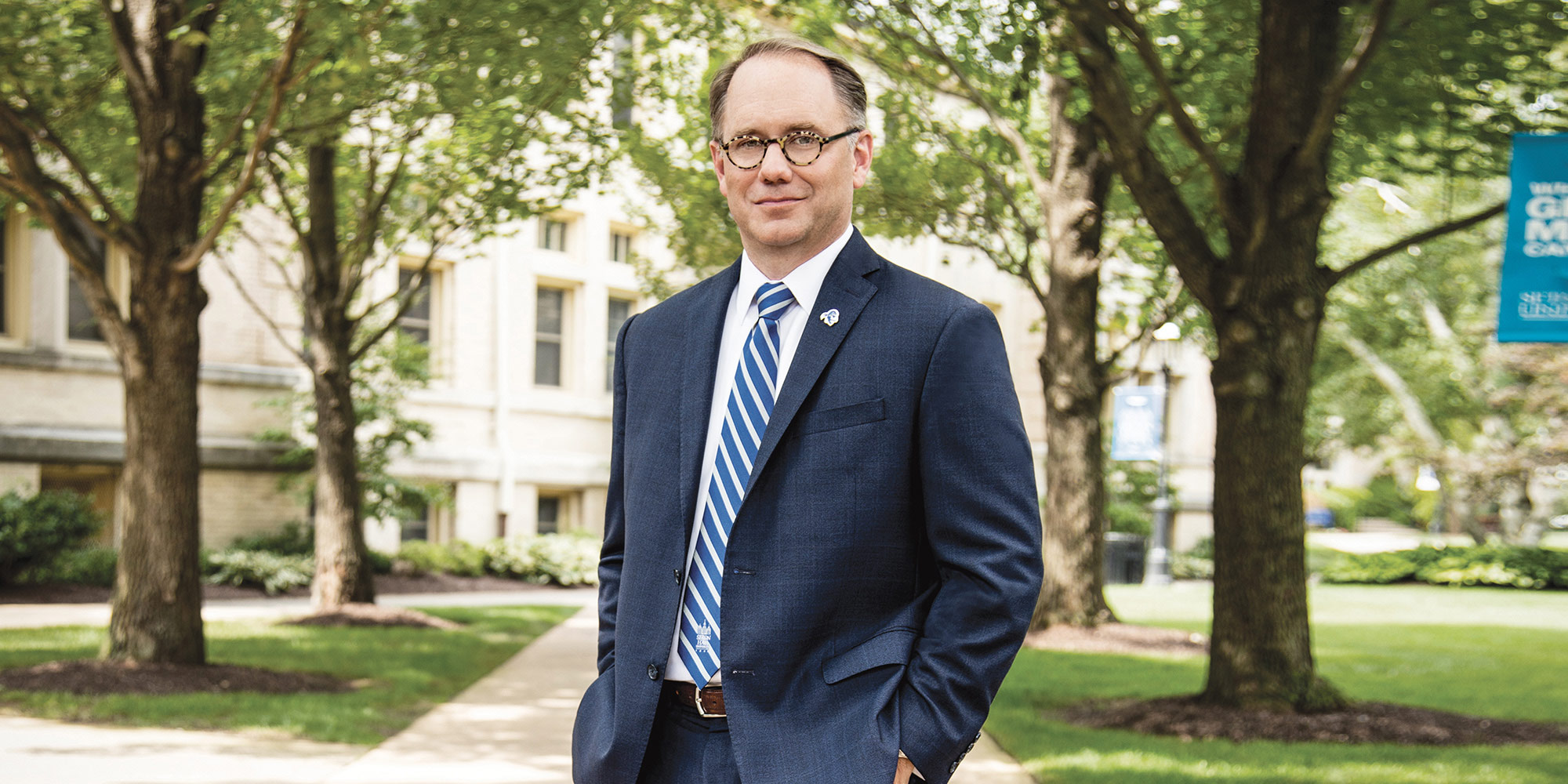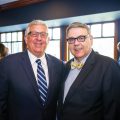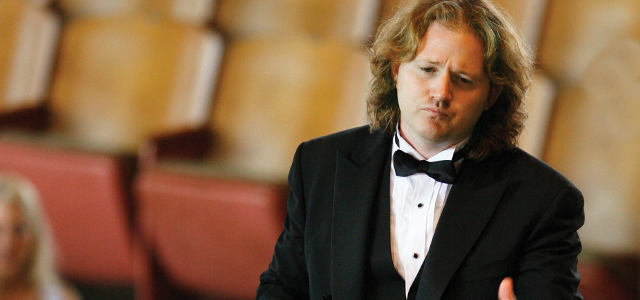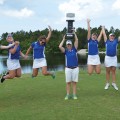As Seton Hall’s first-year students navigated tentative paths through the lunchtime dining hall on their first full day on campus this fall, a man in a suit threaded among them, carrying his own tray and greeting everyone he passed.
“How are you doing?” Joseph Nyre asked one student after another. “What’s your name? Where are you from? How do you like your residence hall?”
Just as it was all new to them, so was it new to him too, a month into his term as Seton Hall University’s 21st president. “I try to greet as many students as possible,” he said.
It is a habit of the Midwest, where he was raised and where unsolicited greetings are much more common than they are in the Northeast. But it is also a management style he brought with him from his previous job as president of Iona College, a Roman Catholic institution in New Rochelle, New York.
One of Nyre’s mantras is, “listen, learn, then lead.” If you have a president who comes in on day one and tells you, “this is how it’s going to be” — that’s a problem, he said. “Because there are many people walking around this university who know much more about it than I do.”
A specific set of beliefs guide how Nyre spends much of his time. “I believe thoroughly in shared governance, which is unique to higher education. I believe in our ability to plan and pull in the same direction to govern collectively. I also believe that university leadership must be engaged in learning about and in advancing the student experience, supporting academic and capital planning, and encouraging alumni to re-experience their alma mater.”
Nyre was a prominent child psychologist before becoming a college president, and he is accustomed to asking questions. “Psychologists are trained to measure aspects of life that historically are difficult to measure,” he said. “I like to think that I still use it every day, in leading and in serving.”
Some of the questions Nyre asks are simple. “How’s the mac and cheese?” he asked one student, contemplating what to add to his lunch tray. “I heard it was pretty good.”
But many are harder, and it was not always easy for him to ask them — to say anything at all, in fact — out loud.
“I would pray each night that I would not be called on at school,” Nyre said about the stutter that plagued him as a boy in a blue-collar part of Beloit in southern Wisconsin. He wouldn’t ask his teachers a question if he didn’t understand something, and when called on to read out loud in class, he couldn’t.
The public school wasn’t serving him, and a Catholic school education seemed out of reach. His mother, the oldest of nine, had grown up working on her family’s farm, and his father worked in maintenance for 30 years at the same Wisconsin dairy plant. Nyre’s mother was adamant about the importance of education, and she believed a Catholic education would change his destiny. So the Nyre family stretched and struggled, and with the help of an uncle, found a way to pay his tuition at Beloit Catholic High School.
“Catholic school saved my life,” Nyre said. His stutter faded, and his grades rose. “It was a fresh start with people who believed in me.”
To go to college — he was the first in his family to make that journey — he enlisted and served in the Navy. “Frankly, I did it because of the GI Bill. I saw it as a wonderful pathway to college,” he said. “I thought it might be the only path.”
At the University of Wisconsin-LaCrosse he delivered pizzas, waited tables, sold men’s suits, worked one summer in a steel mill — and found his career path majoring in psychology. After earning a master’s degree at the University of Missouri, he joined the doctoral program at University of Kansas, where he met his wife. He and the former Kelli McIntyre have been married 24 years and have four children: Hadley, Henry, Charlie and Evelyn.
At the same time, Nyre found a cause. “The more I learned about cognition and childhood disorders, the more it resonated with me, for not only my personal life but for how our system of care supports or may not support people,” he said.
He had a cousin with Down syndrome who lived in a small town in Northern Wisconsin where everyone looked out for her. “Growing up, I thought that was how the world worked — that we take care of each other,” he said. “And it wasn’t until I learned more about our country and our system of care that I realized that’s not the case everywhere.”
It wasn’t how the schools were working in Lawrence, Kansas, where he served as a school psychologist while studying for his doctorate, and where Kelli taught kindergarten through second grade. “He came and said, ‘We’ve got a serious problem in the school district — and in our country. We’re not serving these children well. We need to find more innovative, effective ways of treating them,’” said Michael Roberts, emeritus professor in
the Clinical Child Psychology Program at the University of Kansas.

They designed what they called the Intensive Mental Help Program — where specially trained teachers, psychology graduate students and paraprofessionals worked with emotionally disturbed children whose behavior had led to them being ejected from school, even hospitalized. It took just two months for Nyre’s idea to move from planning meetings to the classroom. The results were immediate.
“What caught my eye was not only that he cared about the children in the school district, but he also knew how to organize, how to get people on board,” Roberts said. “You can just track it through time and can see all the times where he stood out for knowing what needed to be done and identifying the people that he could bring to the table to do it.”
The program and its interventions became a national model, garnering significant grant funding and producing research papers still often quoted in child psychology books and articles. “Joe believes in the power of places and people to change destinations,” Roberts said.
Nyre rose quickly in the field: two fellowships at Harvard Medical School, an offer of tenure after just a single year at Baylor University, and the presidency of the Hope Institute for Children and Families in Springfield, Illinois, a nonprofit dedicated to educating, treating and caring for children with autism spectrum disorders and other developmental disabilities. “I knew that Hope had played a significant role in establishing President Kennedy’s disability policy, which grew to become the current system of care for children with disabilities. I thought I could accelerate my impact there,” he said.
Two weeks after he started at Hope, the organization’s finances unraveled. But with time, hard work and a strong board, the situation eventually turned around. Nyre expanded Hope’s university affiliations and its reach throughout the state. “We changed its business model so it wasn’t just providing direct services to children. It began to unite universities and social-service agencies across Illinois to train pre-service teachers, practitioners and physicians on best practices. There was less focus on residential care and more focus on how to help people earlier,” he said. “We went from serving 100 children to 30,000 people a year.”
Nyre’s time at Hope showed he had the skills to lead a higher education institution like the ones he worked with, and he offered himself as a candidate for a college presidency. Iona College recruited him as its first lay president in 2011.
As with Hope, Nyre’s early days at Iona brought a series of unexpected challenges that tested his resolve — and the spirit of the institution. “Life is about how you show up on your hardest days,” he said. “Either you turn up your nose, or you roll up your sleeves. Sometimes challenges will rip a family or community apart, and other times it will unify them. They unified the Iona alumni base and the faculty and staff.”
In Nyre’s eight years at Iona, the endowment tripled, and the school expanded both the campus itself and its academic offerings. “The school looked completely different from when I started as a first year,” said Erin Kutch, a former Iona student who was president of the student government association as a senior. “Students may not know how much money he [raised] or how many buildings were built, but they know Dr. Nyre as the president who ate in our dining hall and who was at Mass with us on Sunday.”
One person who does know quite well the specifics of Nyre’s track record at Iona is Patrick C. Dunican Jr. He believes “Seton Hall could not have made a better selection.”
Dunican, the chairman and managing director of Newark-based law firm Gibbons P.C., said that Nyre “will lead the University to new, never-before-imagined success. He was marvelous for Iona and will be incredible for Seton Hall.” Dunican has perspective on both schools: He earned his bachelor’s degree at Iona — where he serves on the Board of Legal Trustees — and his law degree at Seton Hall, where he is former chairman of the law school’s Board of Visitors.
Seton Hall is almost three times the size of Iona, but its endowment is not, and increasing the endowment is
a job Dunican thinks Nyre will be especially adept at. “To get [significant] gifts over the line, that takes a lot of skill,” he said, citing what he called Nyre’s “unparalleled” record at Iona. “I think he taps into what motivates the person he’s dealing with. He has extraordinarily high emotional intelligence.”
Nyre believes Seton Hall has
a responsibility to foster great
minds by engaging in the great
conversations, challenges and
debates of today’s global society.
Nyre arrives at Seton Hall at what he calls a “liminal moment” in higher education, when private schools are especially vulnerable. “The enrollment demographics in the Northeast are more than troubling, and the feeder system of Catholic high schools is struggling,” he said. “The number of closures, mergers and acquisitions will accelerate and be significant. Some have argued that either you’re acquiring or you’re going to be acquired.”
Thanks to a strong foundation and the work of many, Nyre’s initial first-year class, 1,615 students, is the largest in Seton Hall’s history. “I believe thoroughly in the power of this place to transform lives,” he said, invoking the University’s tagline, “What Great Minds Can Do.”
Yet for Nyre, it is more than a tagline. He believes Seton Hall has a responsibility to foster great minds by engaging in the great conversations, challenges and debates of today’s global society. “I believe the great debates and challenges of society will either emanate from a university campus or they will quickly find their way there,” he said.
So this fall the University is launching a series of events — called the Great Minds Dialogues — that will allow students to participate in civil, reasoned conversations while examining pressing questions and issues. Through lectures, discussions and panels, students will broaden their perspectives by sharing their ideas and seeing the world as other people see it.
“I think that speaks to what higher education, particularly Catholic higher education, can mean,” he said.
All four of the Nyre children attend Catholic schools. “I saw what a Catholic education did for my husband, how it helped him to reach the place he is today and realize his potential,” Kelli Nyre said. “Even with great public schools everywhere we’ve lived, I like the environment in the Catholic schools. We believe the intersection of faith and education is a wonderful place to live.”
The responsibility of serving as president of a Catholic institution is one Nyre feels deeply. “The highest form of service for a lay leader is to lead at a Catholic institution,” he said. “My excitement in joining Seton Hall is filled with a tremendous sense of appreciation for the deep Catholic foundation and rich history the University enjoys. I’m incredibly grateful for the warm welcome the Seton Hall community has given me, especially the priest community and His Eminence, Cardinal Tobin.”
Nyre didn’t officially start as president of Seton Hall until August 1, but he had so much to do in July that he ended up canceling a planned family RV trip to several national parks in the West. A few days after delivering his eldest daughter to her first year of college, he joined his wife and their three younger children in helping the Seton Hall first-year students move into the residence halls on campus. “Having just gone through it, I could relate to all these parents dropping off their kids,” Kelli Nyre said. “I was able to tell one tearful mom ‘it’s going to be OK,’ and gave her a big hug.”
Upper-class students moved in the next day, and after Nyre’s lunch in the dining hall he walked across the Green, greeting more students. “I knew the names of the presidents at the schools I attended, but I couldn’t pick them out walking across campus,” he said. “I think something unique about Seton Hall is that we should know who’s who, and we shouldn’t have artificial barriers in place. By Christmas maybe some of them will know who I am.”
Sitting on the steps of Jubilee Hall was a gaggle of first years, waiting for their peer adviser to shepherd them to yet another activity meant to acclimate them to their new home. “How are you doing?” Nyre asked them. “Where are you headed next?”







